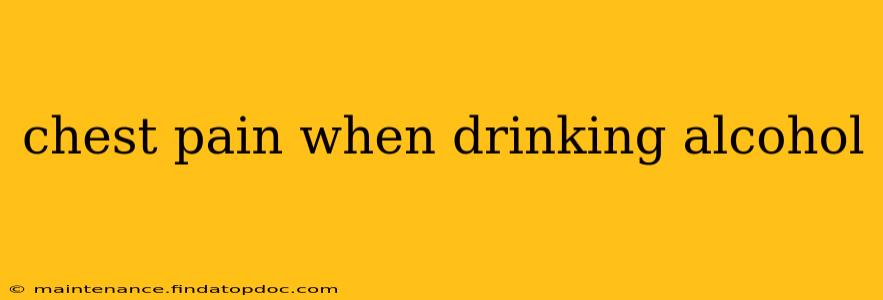Experiencing chest pain after drinking alcohol can be alarming. While sometimes it's a minor discomfort, it can also signal a serious underlying health issue. Understanding the potential causes is crucial for knowing when to seek immediate medical attention. This comprehensive guide explores the various reasons why you might feel chest pain after consuming alcohol, offering insights into prevention and when to contact your doctor.
What Causes Chest Pain After Drinking Alcohol?
Several factors can contribute to chest pain after alcohol consumption. These range from relatively benign issues to serious medical emergencies. Let's delve into the possibilities:
1. Acid Reflux (Gastroesophageal Reflux Disease or GERD):
Alcohol relaxes the lower esophageal sphincter, the muscle that prevents stomach acid from flowing back into the esophagus. This relaxation allows stomach acid to reflux, causing a burning sensation in the chest often mistaken for heart-related pain. The pain can worsen with larger alcohol quantities or lying down after drinking.
2. Heartburn:
Similar to GERD, heartburn is a common digestive issue exacerbated by alcohol. Alcohol irritates the esophageal lining, leading to inflammation and the characteristic burning sensation in the chest. This pain is typically felt behind the breastbone and can radiate to the throat or jaw.
3. Pancreatitis:
Alcohol is a major risk factor for pancreatitis, an inflammation of the pancreas. Pancreatitis can cause severe abdominal pain that may radiate to the chest. Other symptoms include nausea, vomiting, and fever. This condition requires immediate medical attention.
4. Cardiac Issues:
While less common as a direct result of alcohol consumption, existing heart conditions can be aggravated by alcohol. People with angina (chest pain due to reduced blood flow to the heart) might experience intensified pain after drinking. Alcohol can also increase blood pressure and heart rate, potentially triggering chest pain in those with underlying cardiovascular disease. This is a serious concern and warrants immediate medical attention.
5. Anxiety and Panic Attacks:
Alcohol, while often perceived as a relaxant, can paradoxically trigger anxiety or panic attacks in some individuals. These attacks can manifest as chest pain, shortness of breath, and rapid heartbeat. The chest pain experienced during a panic attack is often described as a tightness or pressure.
6. Esophageal Spasm:
Alcohol can sometimes trigger spasms in the esophagus, causing intense chest pain. These spasms are often sudden and can be quite painful but usually resolve on their own.
7. Musculoskeletal Pain:
Sometimes, chest pain after drinking is simply due to muscle strain or tension. This is more likely if the pain is localized and not accompanied by other symptoms like nausea or shortness of breath.
What if I Experience Chest Pain After Drinking?
The severity and nature of the chest pain will dictate the appropriate course of action.
Seek immediate medical attention (call emergency services) if you experience:
- Severe chest pain: Pain that is intense, crushing, or squeezing.
- Chest pain radiating to the arm, jaw, neck, or back: This can be a sign of a heart attack.
- Shortness of breath: Difficulty breathing accompanying chest pain.
- Nausea and vomiting: Especially if severe or accompanied by other symptoms.
- Sweating: Excessive sweating with chest pain.
- Lightheadedness or dizziness: Feeling faint or disoriented.
Consult your doctor if you experience:
- Recurring chest pain after drinking: Even if it's mild, repeated episodes warrant medical evaluation.
- Chest pain accompanied by digestive symptoms: Heartburn, indigestion, or acid reflux.
- Worsening of existing health conditions: If you have a known heart condition, digestive problem, or anxiety disorder, increased symptoms after drinking necessitate medical attention.
How Can I Prevent Chest Pain After Drinking Alcohol?
- Moderate alcohol consumption: Limit the amount you drink.
- Avoid binge drinking: Consuming large quantities of alcohol in a short period significantly increases the risk of various health problems.
- Choose lower-alcohol beverages: Opt for drinks with lower alcohol content.
- Eat before and while drinking: Food helps to slow alcohol absorption.
- Stay hydrated: Drink plenty of water to counteract dehydration from alcohol.
- Avoid mixing alcohol with other substances: Combining alcohol with other drugs or medications can increase the risk of side effects.
Disclaimer: This information is for educational purposes only and should not be considered medical advice. Always consult with a healthcare professional for any concerns regarding your health. They can provide accurate diagnosis and personalized treatment recommendations based on your individual circumstances.
